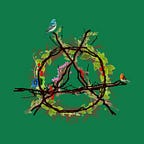Becoming. Wildness. Human/Inhuman. Badgers!
A review of the second editions of Feral Iconoclasm: Anarchy as Rising and Dying and Feral Consciousness: Deconstruction
Julian Langer is an author who is not easy to pin down. They are not the next great thinker of this generation of wild ones. They are not discovering new ideas. They are not superhuman. What Langer writes, what they seek to express are ideas we already know, and show us, is that we are more than ‘Human’, and have the ability to Become.
Linking ideas from Derrida, Deleuze, Althusser, and the likes of Freud and Lacan, Langer brings forth ideas that are actually unique, and in many ways, wild. In the foreword of Feral Iconoclasm: Anarchy as Rising and Dying, Langer writes, “…this book is overly wordy, intentionally confusing and is often indulgent.” I was skeptical of this, it made me nervous it could become some sort of pseudo-intellectual dribble.
I was wrong.
Feral Consciousness: Deconstruction of the Modern Myth and Return to the Woods and Feral Iconoclasm: Anarchy as Rising and Dying have been growing influences on me. My initial reading was scattered, confusing, and frustrating. Without much exposure to aforementioned thinkers, some of the ideas were seemingly inaccessible. What in the hell is this ‘becoming’ and every time I saw the word ‘ontology’ I initially cringed. However, when I stopped reading like I would read Marx or any other theorist, and more as a journal of an expressive mind, it all began to make sense. In fact, these works are majorly a critique of ideological thinking, and specifically that which denies its own ideological framing. Materialism, the Human concept, Civilization, Leviathan are not free of Langer’s feral criticism!
If you read Feral Consciousness and Feral Iconoclasm as doorways to self-evaluation and outwards critique, I believe you begin to read them as they were intended (if there ever was such a true matter of literary intent..). We must see these works as Langer’s way of expressing the wild impulses of individuals and affinities, and not as theoristic blueprints of so-called anarcho primitivism and collapse ideology (I’m looking at you, Ted.)
I can otherwise describe these works in comparison to the likes of Daniel Quinn’s Ishamel or Story of B and John Moore’s Beyond the Fragments: A Reaction to Industrial Society and Its Future. However, this would be unfair to Langer, and their uniqueness, their wild nature, and their project of becoming-more/less-than-human.
I’m likely rambling at this point, and this is not an orthodox way of reviewing a book, but Langer is not orthodox and would not warrant any sort of normalcy. In fact, they’d be offended if I tried!
I will leave this review with a quote from Feral Consciousness, as I feel it best describes these two works:
We can perhaps form the type of communities —
psychological and material — needed to survive what is
to come and, it is to be hoped, we can oppose the
violence and bring it down.
Let the mythologies of the left-right and authoritarian
libertarian political theologies die, and from their
carcasses a forest grow, in which entire communities
can form homes, and live their lives authentically
